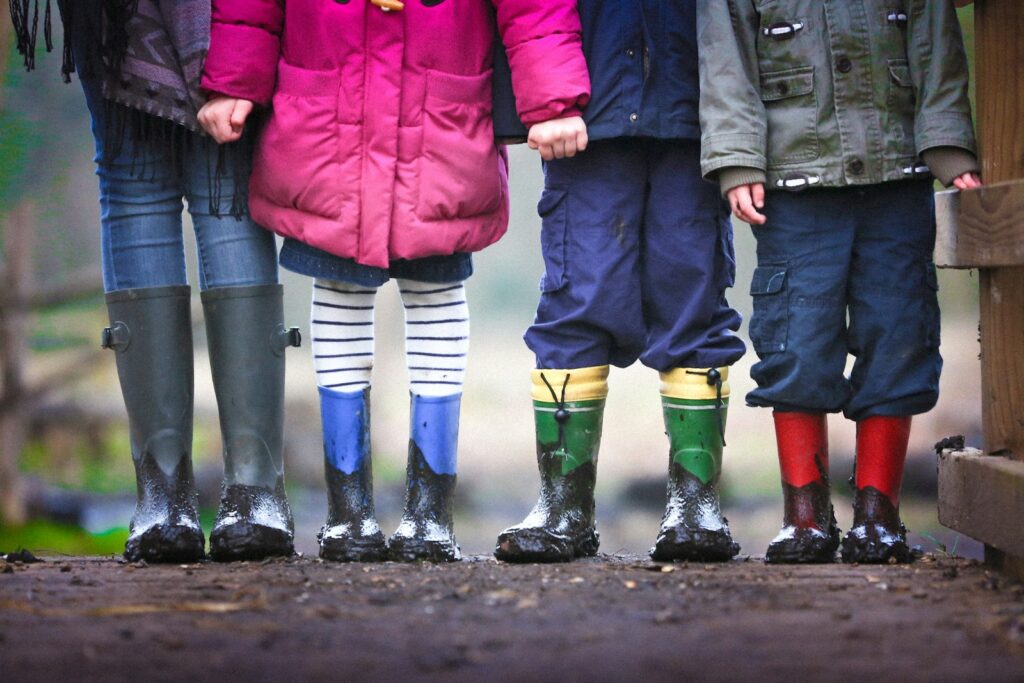You can help your child build confidence and resilience in fun ways that inspire growth. Encourage creative expression through art projects, letting them explore their feelings and ideas. Lead positive self-talk sessions with affirmations that highlight their strengths. Engage in role-playing activities to teach emotional skills and how to navigate challenges. Set achievable goals together, breaking them into manageable steps that celebrate effort. Lastly, it provides avenues that build self-reliance by way of responsibility. These activities provide them with a sense of their identity and are always remembered sweetly. There’s so much more you can learn in order to support your child’s journey.
Creative Expressions Activities
When you involve children in creative expression activities, you are not only teaching them to explore their artistic talents but also building up their confidence and emotional growth. Art exploration allows children to experiment with different materials, from bright acrylics to soft pastels. By giving creative prompts-for example, asking them to draw their favorite animals or scenes from books they have read-you give them an opportunity to tap deep into their imagination.
Arts and crafts projects, such as making personalized greeting cards or special jewelry, are also ways to celebrate identity and develop practical skills. Themed scavenger hunts inspire curiosity and a feeling of accomplishment while exploring the surroundings. The creative expression activities also allow children to work on emotional awareness by helping them explain how they feel as they express themselves in their artwork. Working with various materials like acrylics and oil paints fosters creativity and enhances artistic expression.
Photography and printmaking introduce new avenues for expression, teaching kids about composition and perspective while they capture their world. Encourage them to document their experiences in a photo journal, allowing for reflection and growth. Throughout these activities, be mindful of their emotional responses. Discussing feelings as they create can enhance emotional literacy.
Positive Affirmations Techniques
Creative expression activities provide a strong foundation for children’s emotional development; including positive affirmations will enhance their confidence and self-image. Positive affirmations are simple yet powerful statements that help to turn negative thoughts into uplifting beliefs. You help your child build a healthy sense of self when you integrate these into his daily routine.
Start with affirmation stories to which your child can relate, and help them create personalized positive mantras based on their strengths and aspirations. Visual means, such as an affirmation board, may make such statements more realistic, and mirror affirmations are those that remind one every day of one’s self-worth. Daily affirmations could also greatly help in the improvement of self-image and the reinforcement of a positive mind.
Affirmations can be made fun: make them rhyme, like little songs, or affirmation bracelets. To give them more power, repeat the statements three times each day, which will further reinforce positive thinking. Incorporate reflective questions that promote deeper thinking about their affirmations and how they relate to their lives. Positive affirmations have a tendency to create better mental health outcomes by helping children build resilience through challenges.
As you model this practice, you create an environment of open communication and support. Remember, the goal is to foster resilience and confidence, allowing your child to navigate life’s challenges with optimism and self-belief.
Engaging Role-Playing Ideas

Role-playing is a dynamic way of building up the confidence and resilience of children through exposure to different scenarios that stimulate growth. Children, through role-play, are able to take on different characters and stand in others’ shoes, thereby being able to explore their emotions and reactions in safety.
Consider creating empowerment scenarios in which your child becomes a superhero or a confident leader. Such activities nurture not only fantasy but also self-esteem. Celebrating accomplishments through these scenarios can reinforce their sense of achievement and motivation even more. Helping children develop resilience through playing these roles will prepare them for everyday life and its many challenges.
You can also focus on conflict management through role-playing of difficult interactions, teaching them assertive communication and problem-solving skills.
Encourage scenario exploration that includes setting boundaries with peers or adults, helping your child understand the importance of personal space.
For older kids, role-playing public speaking is a fun way to practice presenting topics they’re interested in, enhancing their confidence in social situations.
Co-operative plays and collaborative storytelling further refine their social skills, with the added benefit of drama and skit performances for empathy.
Building Confidence through Effective Goal Setting
Goals set by children provide meaning and direction. Encourage your child to start off setting SMART goals: specific, measurable, achievable, relevant, and time-bound. This clarity will make the motivation greater and let them effectively visualize success. Engagement in activities such as interest mapping will help identify the student’s personal passions and preferences that will guide the student’s goal-setting process. Early goal setting will build a foundation for later times to ensure that children will acquire skills relevant throughout life.
Break down larger goals into manageable steps. That way, your child can attack smaller, achievable mini-goals that lead to the bigger picture. Prioritize these steps and establish checkpoints for achievement tracking, ensuring they recognize progress along the way.
Make goal setting engaging and interactive by using visual tools like vision boards. Incorporate creativity through games or fun activities, making the process enjoyable. Ask open-ended questions to spark deeper thinking about their aspirations.
Encourage resilience by emphasizing effort over outcome. Discuss potential obstacles and prepare your child to adapt strategies when challenges arise. Celebrate milestones and provide continuous support, reinforcing their journey.
Practical Experience Opportunities
Many times, involving children in practical experience opportunities can significantly improve their confidence and life skills. One of the most practical ways to do this is through team projects, such as running a lemonade stand. Your child will learn to set goals and assume responsibilities in such a setting, hence boosting their self-esteem. They also get hands-on experience in decision-making and customer interactions, allowing them to practice social skills and express their creativity in marketing and design. Moreover, these experiences can promote healthy self-esteem, which is essential in their emotional development. Additionally, enrolling your child in structured activities like BJJ for kids can foster discipline, build physical confidence, and teach valuable life skills such as teamwork and perseverance. Such activities also help in the building of emotional resilience, wherein the child learns to cope with and overcome adversities in a supportive environment.
Another great avenue is community involvement. When your child takes part in local events or volunteer projects, they are not only building a better community but also fortifying themselves through realistic trials and tribulations. In doing so, valuable experiences in hard work, cooperation, and the satisfaction of shared success are gained.
Encouraging your child to embrace these practical experiences fosters a sense of independence and self-reliance. As they navigate these opportunities, celebrate their efforts and the lessons learned along the way, emphasizing that mistakes are simply stepping stones to growth.
Nurturing Emotional Intelligence

While it may sound daunting, nurturing your child’s emotional intelligence is a rewarding journey that will significantly affect their confidence and relationships. Model emotional awareness by recognizing your feelings throughout the day. This simple act of recognizing emotions teaches emotion recognition and also shows your child that emotions are normal and changeable. Share your experiences and coping strategies to help them manage their own feelings.
Empathy should be encouraged. Discuss emotions of characters in stories or real-life situations, and encourage your child to put themselves in others’ shoes with role-playing. Tools like an emotion chart help them recognize and understand various feelings. Greater emotional intelligence is related to higher communication skills and improves the conflict resolution skills of your child.
Encourage the free expression of feelings by using open-ended questions where your child can describe their feelings accurately. Let them know it’s okay to feel this way, and engage them in some fun activities like dancing or drawing to express these emotions. According to research, good emotional skills boost resilience to stress.
Finally, put emotional intelligence into daily practice: check in with your feelings during mealtimes or playtime. It doesn’t only help your children validate their feelings but also opens up a line of communication.
Celebrating Achievements Together
When you celebrate your child’s achievements, no matter how small, you create an environment that nurtures their confidence and reinforces their sense of self-worth. Focusing on progress, instead of just outcomes, helps your child appreciate their journey. Establish achievement rituals where even the smallest feats are celebrated, while commending effort and persistence in the process. This instills a growth mindset within them, allowing them to reflect on their journey toward success and love the challenge. Such achievements will definitely boost their motivation and self-esteem as they witness their very own growth through time. Positive reinforcement will also assist children in relating pride with their efforts, hence improving their sense of achievement.
Create a culture of celebration with family and friends by participating in these moments. Organize parties or create a scrapbook together that will help your child remember milestone reflections. Such shared acknowledgment will not only help in strengthening bonds but also in building pride in the child’s achievements.
Conclusion
With the incorporation of these fun activities into the routine, you’re helping your child build up confidence and resilience, but also nurturing the potential for emotional growth. Research has shown that through creative expression and social learning, children develop better coping mechanisms and a healthier self-image. Celebrate their achievements no matter the size, and watch them thrive. Remember, your support is their greatest asset, guiding them through life’s challenges with confidence and grace. Together, you can empower their journey!

